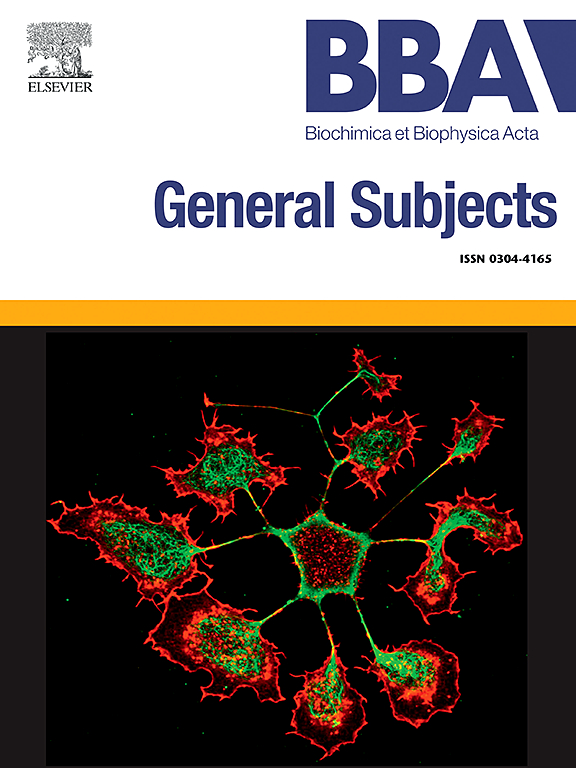甘露糖聚糖在训练免疫中的关键作用:一种新的抗肿瘤催化剂。
IF 2.2
3区 生物学
Q3 BIOCHEMISTRY & MOLECULAR BIOLOGY
Biochimica et biophysica acta. General subjects
Pub Date : 2025-02-21
DOI:10.1016/j.bbagen.2025.130779
引用次数: 0
摘要
众所周知,从微生物中分离的细胞壁聚糖在训练免疫(TI)的背景下,可引起由先天免疫细胞群(包括单核细胞)主导的强烈免疫反应。然而,酵母衍生甘露聚糖在单核细胞重编程中的作用仍然不明确。在这里,我们证明了TI通常伴随着由单核细胞表达的选定的聚糖结合蛋白的基因表达谱的改变,包括DC-SIGN和Dectin-2。此外,我们发现甘露糖,一种富含甘露糖的聚糖,可以在健康的单核细胞中触发增强的与TI兼容的免疫表型,多糖引发的细胞表现出增强的促炎细胞因子分泌(TNFα和IL-6)和更高的活化(CD86)水平。此外,聚糖介导的单核细胞启动也会改变某些聚糖结合蛋白(如DC-SIGN)的表达。重要的是,我们确定了这些甘露聚糖训练的免疫细胞在体外显示出更好的杀死肿瘤细胞的能力。最后,我们证实,注射卡介苗治疗的非肌肉浸润性膀胱癌患者的单核细胞呈现TI表型,这是由更高的细胞因子产生和激活所揭示的。总之,本研究为利用糖源性病原体对先天免疫细胞进行重编程以实现有效的抗肿瘤免疫应答奠定了基础。本文章由计算机程序翻译,如有差异,请以英文原文为准。

“Mannose glycans as key players in trained immunity: A novel anti-tumoral catalyst”
Cell wall glycans isolated from microorganisms are long known to provoke strong immune responses piloted by innate immune cell populations, including monocytes, in the context of Trained Immunity (TI). However, the contribution of yeast-derived mannan in the reprogramming of monocytes remains ill-defined. Here, we demonstrated that TI is often accompanied by an altered gene expression profile of selected glycan-binding proteins expressed by monocytes, including DC-SIGN and Dectin-2. Additionally, we showed that mannan, a mannose rich glycan, can trigger an enhanced immune phenotype compatible with TI in healthy monocytes, with glycan-primed cells exhibiting enhanced pro-inflammatory cytokine secretion (TNFα and IL-6) and higher activation (CD86) levels. Furthermore, the glycan-mediated priming of monocytes also imposed alterations to the expression of certain Glycan-Binding Proteins, such as DC-SIGN. Importantly, we established that these mannan-trained immune cells displayed an improved capacity to kill tumor cells in vitro. Lastly, we confirmed that monocytes from non-muscle invasive bladder cancer patients treated with BCG instillations presented a TI phenotype, as was revealed by the higher cytokine production and activation. Altogether, this study lays the foundations for exploiting the immunological potential of glycan-derived pathogens in reprogramming innate immune cells towards an effective anti-tumor immune response.
求助全文
通过发布文献求助,成功后即可免费获取论文全文。
去求助
来源期刊

Biochimica et biophysica acta. General subjects
生物-生化与分子生物学
CiteScore
6.40
自引率
0.00%
发文量
139
审稿时长
30 days
期刊介绍:
BBA General Subjects accepts for submission either original, hypothesis-driven studies or reviews covering subjects in biochemistry and biophysics that are considered to have general interest for a wide audience. Manuscripts with interdisciplinary approaches are especially encouraged.
 求助内容:
求助内容: 应助结果提醒方式:
应助结果提醒方式:


